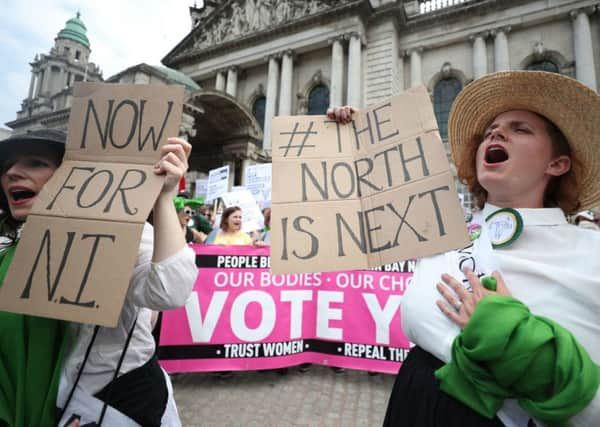Diana Johnson: Time to remove the stigma from our abortion laws and make them up-to-date


The Offences Against the Person Act 1861 states that any woman procurring her own miscarriage and anyone who assists her can go to prison for life.
The 1967 Abortion Act allowed legal abortion in certain circumstances for women in England and Wales. The conditions included the need for two doctors’ signatures confirming that termination is necessary to prevent permanent injury to the physical or mental health of the pregnant woman.
Advertisement
Hide AdAdvertisement
Hide AdOne in three women will have an abortion during their lifetime. These days 80 per cent of abortions happen in the first 12 weeks of pregnancy and are now induced medically through taking tablets rather than via surgical procedures.
Women’s healthcare has evolved and so have societal attitudes to abortion. In 2016, the British Social Attitudes Survey found that 70 per cent of British adults believe that abortion should be allowed if a woman decides on her own to end the pregnancy, compared to only 24 per cent in 1984.
The 1967 Act was never applied to Northern Ireland where the abortion regime remains one of the most restrictive in the world – not allowing abortion in cases of rape, incest or fatal foetal abnormality. A woman in Northern Ireland seeking an abortion after being impregnated as a victim of sexual crime could face a heavier criminal punishment than the perpetrator – the real criminal.
This June, the Supreme Court found that Northern Ireland’s current abortion laws breach women’s human rights. With the Northern Ireland Assembly moribund since January 2017, Westminster politicians can no longer look away while vulnerable women in Northern Ireland, often suffering in desperate circumstances, have their human rights breached.
Advertisement
Hide AdAdvertisement
Hide AdAs Hillary Clinton said in 1995, “human rights are women’s rights and women’s rights are human rights” – moreover these human rights don’t recognise any hard border in the Irish Sea.
Polling research released earlier this month by Amnesty International shows that 65 per cent of people in Northern Ireland believe that “having an abortion should not be a crime”; and 66 per cent supported the view that in the absence of devolved government “Westminster should legislate to reform the law”. This came after the Republic of Ireland’s referendum in May 2018, where 2.1 million voted and two-thirds backed reform.
However, even in England or Wales a woman who uses abortion tablets bought online is committing a criminal offence punishable by life imprisonment. It’s often the most vulnerable women, finding it difficult to access termination services, who turn to the internet.
Women on Web, a doctor-led online medical service, say that 16 per cent of women cite domestic or ‘honour’ violence, and eight per cent intimate partner violence, as reasons to seek tablets online. Women impregnated by rape are often denied contraception – sometimes forcibly – to keep them bound to the abuser.
Advertisement
Hide AdAdvertisement
Hide AdWhether it’s in Bradford, Bangor or Belfast, women need access to a supportive, humane, properly regulated medical regime for abortion care, encouraging them to come forward for professional advice and treatment – not driving them, isolated and scared, into the unregulated internet pills market.
That’s why my Abortion Bill is supported by The Royal College of Obstetricians and Gynaecologists, The Royal College of Midwives and The British Medical Association; along with Amnesty International, Women’s Aid and many others. MPs from five Westminster parties are backing the decriminalisation of abortion across England, Wales and Northern Ireland.
My Bill ensures that up to 24 weeks – the current time limits will stay – women and clinicians would no longer be subject to the criminal law. However, decriminalisation wouldn’t mean the deregulation of abortion. My aim is more effective regulation that is fit for purpose now in 2018 – not 51 or 157 years ago.
The existing body of law and professional standards governing medical procedures would stay to ensure safe termination services.
Advertisement
Hide AdAdvertisement
Hide AdMy Bill will also strengthen protection for women. Anyone – an abusive partner, for example – who ends a pregnancy against a woman’s wishes through violence, or by administering abortion pills without her knowledge, would be subject to a life sentence – turning the criminal law against the actual criminals. My Bill also protects doctors and nurses who conscientiously object to abortion – enshrining this in law for the first time in Northern Ireland.
It’s time to remove the Victorian misogynist stigma from our abortion laws and to have laws that are woman-centred – removing the criminal courts from decisions that a woman takes about her own body.
Diana Johnson is the Labour MP for Hull North. She is due to present her Abortion Bill to Parliament today.